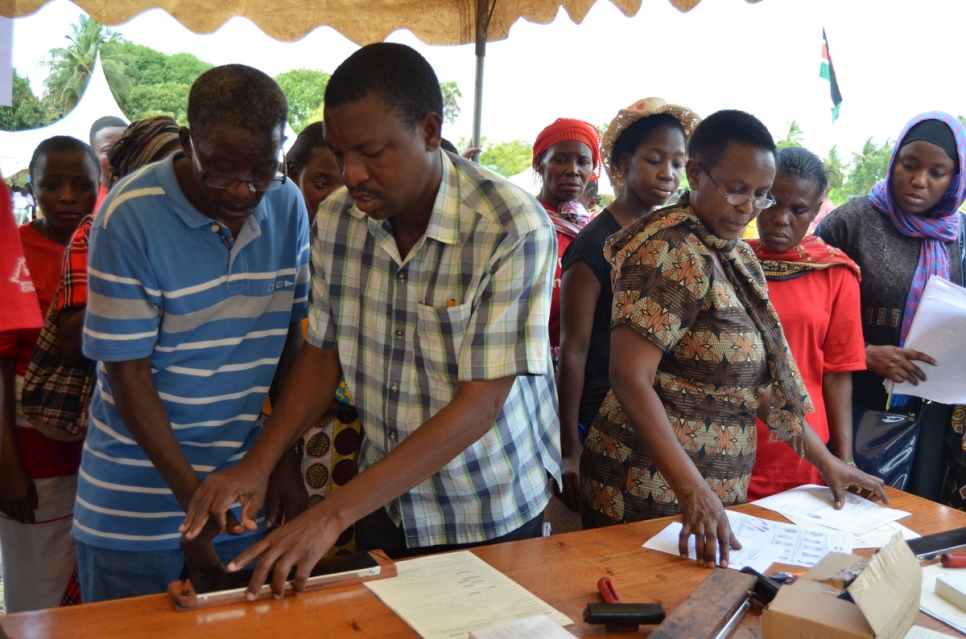
Amina Kassim would like to register to vote in the next elections in Kenya, where she was born and has lived all her life, but is unable to do so.
Descended from an ethnic group from southeast Tanzania and northern Mozambique who had come to work as field labourers in the 1930s, she has no nationality. That means she has no Kenyan Identity Card to make her eligible for many things, including voting.
“When I get an ID card, I would like to vote like any other Kenyan, that is my joy,” says Amina.
She is among some 6,000 Makonde people whose parents and grandparents arrived in Kenya as early as 1936 to work as labourers in the sisal and sugarcane farms on the East African coast. Most never returned home.
“They say ‘you are not from Kenya’ and yet I was born here, grew up here, I went to school here, everything I did in this country.”
While they settled and formed families, their descendants have long been ineligible for citizenship, denying them access to a full range of vital services that most Kenyans take for granted, including even basic healthcare, higher education. Without ID papers registering for financial services, obtaining loans, and even getting a mobile phone card can be problematical.
In Kenya, the Makonde and their descendants cannot legally marry, or even acquire registration documents including birth certificates. Those who applied for naturalization found they are unable to obtain the documents needed to support their applications.
“It is very difficult to get an ID because when you go for vetting, they say ‘you are not from Kenya’ and yet I was born here, grew up here, I went to school here, everything I did in this country,” says Costa, a young Makonde who spent almost six years trying unsuccessfully to obtain a birth certificate.
Worldwide there are at least 10 million people in Amina and Costa’s situation. UNHCR is working to help them obtain citizenship. The UN Refugee Agency works with governments around the world to identify, prevent, and resolve stateless situations.
To advance this goal, UNHCR launched a global push two years ago to end statelessness in ten years. The #IBelong Campaign is commemorated yearly and through the Campaign countries working on statelessness can track their achievements.
Marking its second anniversary, UN High Commissioner for Refugees Filippo Grandi renewed a call for a concerted international push to end the phenomenon. Being without a nationality is frequently compared to being “invisible,” a situation that is particularly tough for children, Grandi said.
“For stateless children and youth, being ‘invisible’ can mean missing out on educational opportunities, being marginalized in the playground, being ignored by healthcare providers, being overlooked when it comes to employment opportunities, and being silenced if they question the status quo,” Grandi said, stressing that: “All children should have a nationality. All children should belong.”
Fortunately, for the Makonde a resolution to their decades-long plight is finally on the way. Through the Kwale County Legal and Justice Assembly Committee, they successfully petitioned Kenyan President Uhuru Kenyatta last year to review their case. In response, he called for the formation of a taskforce to look into statelessness in the country.
“For stateless children and youth, being ‘invisible’ can mean missing out on educational opportunities, being marginalized.”
The multi-agency taskforce, which includes the Directorate of Immigration and Registration of Persons, the National Registration Bureau, Kenya National Bureau of Statistics, the Department of Refugee Affairs and the National Intelligence Services, began gathering case data and information about the Makonde and other stateless groups in Kenya. A report with recommendations was completed last November.
The recommendations formed the basis for a drive to register and naturalize the Makonde, as well as members of the Pemba and Rundi communities – the descendants of migrant farm labourers from Rwanda – many of whom are also stateless.
Frustrated by delays, Makonde activists sought backing this year from the Kenya Human Rights Commission, and finally resolved to set out on a four-day walk from Kwale County to the Statehouse in Nairobi to meet with President Kenyatta. At a meeting with the President, the group’s chairman Thomas Nguli expressed their feelings.
“We have come here because we seek ID cards, without IDs we cannot do anything in this country,” he said.
Determined to resolve their case, Kenyatta then issued a directive for their naturalization and registration as citizens of Kenya by December 2016.
“I apologize that it took too long to give you justice as fellow Kenyans,” Kenyatta told them, adding: “Today is the last day you will be called visitors.”
For Lucas, a Makonde who has no paid work but farms to feed his family, it is very welcome news: “When the government gives us ID cards, we will be happy because we have children, and we will get an opportunity to be able to fend for them.”

